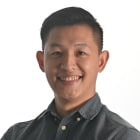Analysts expect ‘major’ Cabinet reshuffle, with defence, finance and DPM roles the ones to watch
Prime Minister Lawrence Wong is expected to bring in new political office holders and reassign key ministers as he forms his first Cabinet following the PAP's strong election showing.
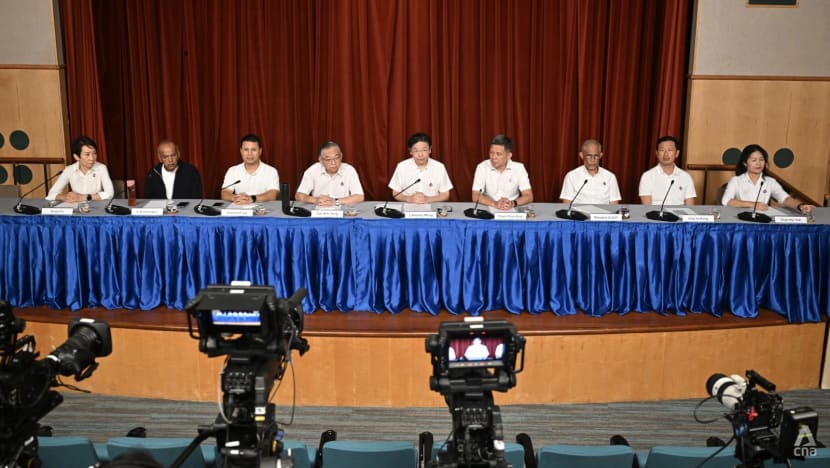
(From left to right) Grace Fu, K Shanmugam, Desmond Lee, Gan Kim Yong, Lawrence Wong, Chan Chun Sing, Masagos Zulkifli, Ong Ye Kung, Chan Hui Yuh at a post-election press conference in The Treasury on May 4, 2025. (Photo: CNA/Jeremy Long)

This audio is generated by an AI tool.
SINGAPORE: A major Cabinet reshuffle is expected following the May 3 election, with the roles of finance minister, defence minister and deputy prime minister among the most closely watched, political analysts said.
With the People’s Action Party (PAP) securing 65.57 per cent of the national vote, Prime Minister Lawrence Wong is expected to form his own team and appoint new political office holders to shape the fifth-generation leadership.
The upcoming reshuffle will mark the first Cabinet Mr Wong fully forms since succeeding Mr Lee Hsien Loong in 2024.
Post-election reshuffles typically occur within two to three weeks after a General Election. At a press conference held after the election results were announced, Mr Wong acknowledged that Cabinet formation would be a priority.
“There is added urgency this year given the need to deal with the uncertainty of the trade war and the tariff situation,” said National University of Singapore (NUS) associate professor Chong Ja Ian.
Analysts noted that a major reshuffle has not occurred since 2021, with COVID-19, the leadership transition and mounting global uncertainty contributing to continuity in recent years.
The mostly unchanged portfolios have helped provide stability in the government, said Assoc Prof Chong.
That said, some portfolios may remain untouched despite long tenures, particularly in “specialist ministries” such as trade and industry, foreign affairs, law and home affairs, said Mr Malminderjit Singh, managing director of Terra Corporate Affairs.
Among the current batch of Cabinet members, Dr Vivian Balakrishnan has been leading foreign affairs for 10 years and Mr K Shanmugam has been overseeing home affairs and law for 10 years and 17 years respectively.��
CLEAR SHIFT TO 4G
With the retirement of three veteran ministers – Senior Minister Teo Chee Hean, Deputy Prime Minister Heng Swee Keat and Defence Minister Ng Eng Hen – and many of the current Cabinet members having held their portfolios since 2020, Mr Wong has room to make bold moves, analysts said.
Singapore Management University’s law don Eugene Tan said the reshuffle would be major, as Mr Wong would want to show the depth of talent within the ruling party.
“Most of the 4G are not ‘his’ people. They all came in at about the same time," Assoc Prof Tan said. "There will be a focus from PM Wong on appointing people at the junior ministerial levels, where they would get their first POH appointments in his tenure.”
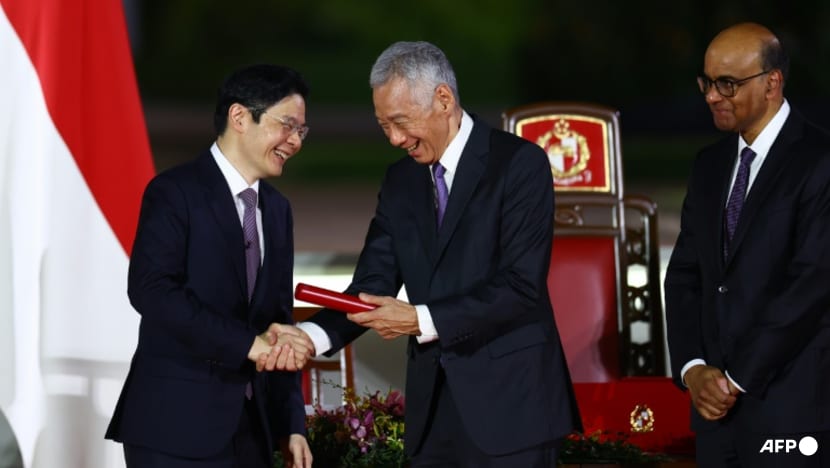
Institute of Policy Studies (IPS) research fellow Teo Kay Key said the strong election results mean Mr Wong retains the full slate of ministers – apart from those who retired – from the previous Cabinet, giving him flexibility.
The reshuffle is also likely to signal a "clear transition" from the 3G leadership to 4G, said Mr Singh.
“While PM Lawrence Wong took over a year ago, he had retained many 3G leaders in his Cabinet. This will be his moment to shape the team that he sees best fit to work with him for the next five years at least, ” he said.
Independent political observer Felix Tan said the reshuffle would be a test of Mr Wong's campaign rhetoric on renewal and trust in new candidates.
“If you don't put them into positions, then it goes against the entire rhetoric that he was talking about throughout the campaign, about finding new blood,” he said.
However, IPS' Dr Teo said the PM may also opt for a more measured approach, making incremental changes over time, given global uncertainties.
NEW DEFENCE MINISTER NEEDED
Among the most significant appointments will be that of a new defence minister. Dr Ng, an oncologist who held the post for 14 years, retired ahead of the election.��
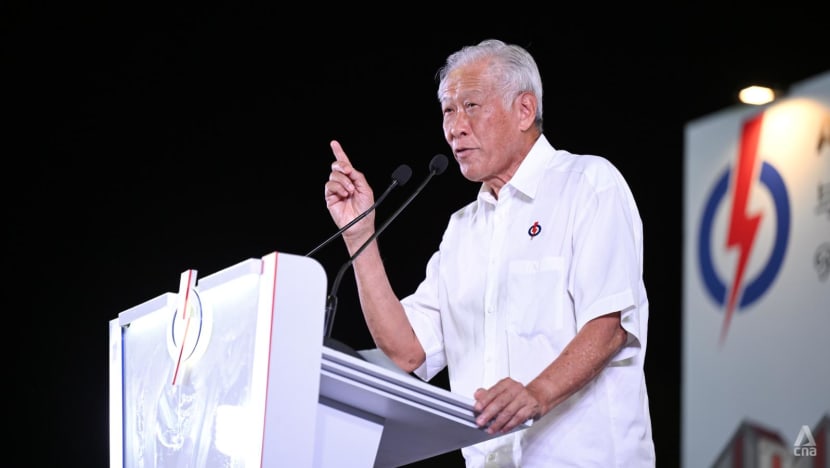
While several Cabinet members have military backgrounds – such as Senior Minister Lee Hsien Loong and Education Minister Chan Chun Sing – observers said the role requires more than operational expertise.
Only one former military officer has ever gone on to become a full defence minister: Senior Minister Teo Chee Hean, who held the portfolio from 2003 to 2011.
Assoc Prof Chong said the role of a defence minister is very different from that of a senior uniformed officer, as it deals more with policy, legislation and budgets.
There is no clear heir apparent to Dr Ng. The government has in the past drawn from former military leaders for Cabinet roles, and some MPs such as Gan Siow Huang and Desmond Tan – both ex-brigadier-generals – have already taken on political office.
“We now have a number of ex-uniformed services leaders in Cabinet, so the PM could rely on familiarity and appoint one of them, or continue in the spirit of having a different, outside view, and appoint someone not from the defence forces,” said Mr Singh.
The job requires stature, political capital and gravitas to be able to navigate bilateral defence ties, he added.
WILL PM WONG RELINQUISH FINANCE?
Mr Wong’s decision on whether to continue as finance minister will also be closely watched.
He could decide to hand over the portfolio to focus on national leadership. Then-Prime Minister Lee Hsien Loong stayed on as finance minister for three years before passing the role to Mr Tharman Shanmugaratnam in 2007.
Mr Wong has done "a lot of the heavy lifting" to shore up Singapore's fiscal position in recent years and may now delegate the finance portfolio, said Mr Singh.
Dr Teo added that while understanding the ins and outs of the finance ministry is helpful, the workload is "taxing" given that it is a heavy portfolio.��
Still, others believe he may keep the portfolio in the short term. This will help him to fully implement the Forward Singapore agenda, which will unfold over several Budgets, said SMU's Assoc Prof Tan.
“He may want to stay in the leading role and hold onto the purse strings,” Assoc Prof Tan added.
Observers also expect Mr Wong to appoint a second deputy prime minister with Mr Heng stepping down, restoring the dual-deputy structure that was in place under past leaders.
“Usually there are two different DPMs – one for the economy, the other more of looking into the defence and security landscape,” said Dr Felix Tan.
NEW FACES IN POLITICAL OFFICE
Observers expect several new MPs to be appointed as political office holders in this reshuffle.��
During the campaign, Mr Wong highlighted several candidates as having leadership potential: David Neo, Dinesh Vasu Dash, Jeffrey Siow and Hamid Razak.��
Home Affairs and Law Minister K Shanmugam also said before the hustings that Nee Soon GRC new faces Goh Hanyan and Syed Harun Alhabsyi are potential political office holders.
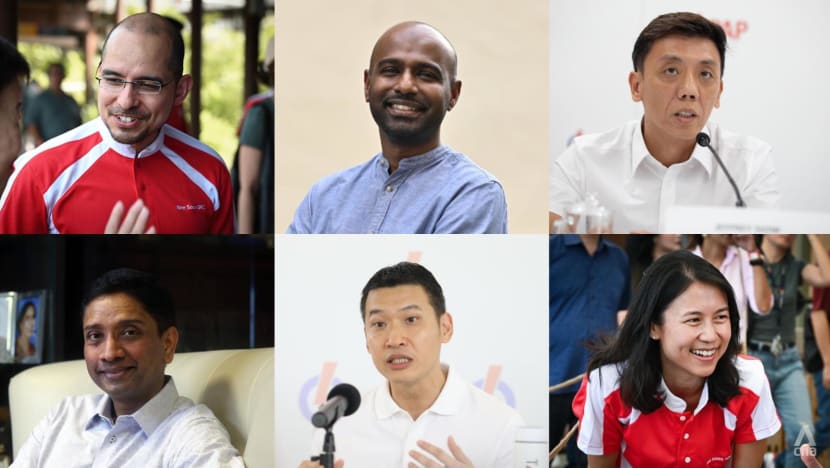
All were successfully elected on May 3.
These individuals may take on junior roles – such as ministers of state or parliamentary secretaries – where their capabilities can be assessed, analysts said.
They could even be appointed in more substantial roles, said Mr Singh.��
After the 2015 election, newcomers Ong Ye Kung and Ng Chee Meng became co-acting ministers for education. In 2020, six new faces became political office holders after their first election – including Dr Tan See Leng, who was appointed Minister in the Prime Minister's Office and Second Minister for Manpower and for Trade and Industry.
However, experts said that Dr Tan’s appointment was more the exception rather than the norm, as he came with a significantly vast private sector experience.
“There's nothing stopping him (Mr Wong) from giving some of the newer faces a full ministerial position as well. They will then have at least a longer track record to prove themselves,” said Dr Felix Tan.
Analysts also noted that the ruling party's central executive committee (CEC) and the Cabinet are distinct entities, so ministers may not necessarily sit on the PAP's highest decision-making body.
Mr Wong became party secretary-general in December, but Deputy Prime Minister Gan Kim Yong is not in the current CEC. Nevertheless, Mr Gan was PAP chairman from 2018 until he stepped down in 2022.
"Separation of party and state is vital," said SMU's Assoc Prof Tan, adding that the party CEC line-up does not have to reflect the make-up of the Cabinet. Apart from Mr Gan, Mrs Josephine Teo and Dr Ng for example are also not in the current CEC.��
This issue was a talking point during the GE, where Mr Wong downplayed the CEC’s relevance to Cabinet appointments, saying that Mr Gan’s role in government remains significant regardless of his CEC status.
Dr Felix Tan said: "The party is the party, the government is the government. The party decides who to put in government as they are the winners in the elections."
While ministers may not necessarily be part of the CEC, it remains to be seen whether those holding key party positions would be given expanded responsibilities in the government.��
These include assistant secretaries-general Chan Chun Sing and Desmond Lee, treasurer K Shanmugam, assistant treasurer Ong Ye Kung, and organising secretaries Grace Fu and Edwin Tong.
THE NG CHEE MENG QUESTION
One man who is in the PAP CEC but is unlikely to be appointed as a Cabinet Minister is labour chief Ng Chee Meng.��
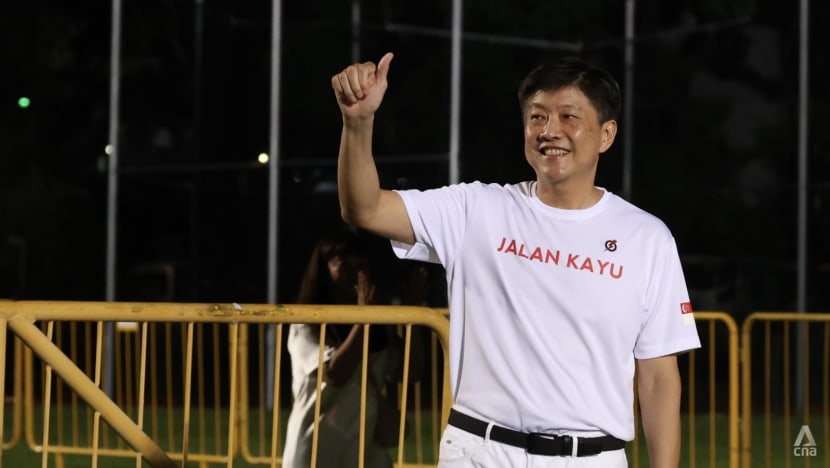
Earlier this week, the Jalan Kayu MP said he has asked Mr Wong not to consider him for a government post.
Labour chiefs have traditionally held ministerial roles – typically as Minister in the Prime Minister’s Office – reflecting the close partnership between the PAP and the National Trades Union Congress.��
Experts said Mr Ng’s decision may be a pragmatic move to avoid further distractions.
“This is rare indeed, but given the circumstances that he is in, this might be the best way forward for him," said Dr Felix Tan.��
Mr Ng not being a minister is unlikely to have any implications since he has been the labour chief for the last five years despite not being elected nor in government, he added.





